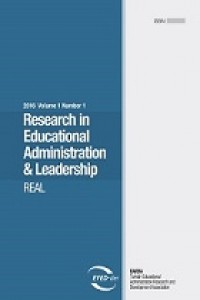Abstract
References
- Alvesson, M., & Sveningsson, S. (2003). The great disappearing act: difficulties in doing 'leadership'. The Leadership Quarterly, 14(3), 359-381. Berger, P. (1966). Invitation to sociology: a humanistic perspective. Harmondsworth: Pelican. Bourdieu, P., Chamboredon, J.-C., & Passeron, J.-C. (1991[1968]). The craft of sociology: epistemological preliminaries (R. Nice, Trans.). New York, NY: Walter de Gruyter. [Originally published as Le métier de sociologue: préalables épistémologiques (Paris: Mouton).]. Bourdieu, P., & Wacquant, L. (1992[1992]). An invitation to reflexive sociology. Cambridge: Blackwell Publishers. [Originally published as Le Metier De Sociologue: Prealables Epistemologiques (Paris: Mouton).]. Branson, C. M., Franken, M., & Penney, D. (2016). Middle leadership in higher education: A relational analysis. Educational management Administration & Leadership, 44(1), 128-145. doi:10.1177/1741143214558575 Bush, T. (2017). The rise and rise of leadership. In G. Lakomski, S. Eacott, & C. W. Evers (Eds.), Questioning leadership: new directions for educational organizations (pp. 58-69). London: Routledge. Bush, T. (2018). Relational Leadership: New Thinking or Established Ideas in “New Clothes” Beyond Leadership: A Relational Approach to Organizational Theory in Education (pp. 177-187). Singapore: Springer Singapore. Cardno, C. (2012). Managing effective relationships in education. London: SAGE.
Abstract
Classic organizational theories build on substantialist assumptions and grant ontological status to organizations. Relational theorizing provides germinal resources for an epistemological breakthrough in how we come to understand organizations and organizing. This paper, based on my 2018 book ‘Beyond leadership: A relational approach to organizational theory in education’, serves two purposes. First, it provides an overview of the relational research program – both the methodological framing and the three key intellectual resources of ‘organizing activity’, ‘auctor’, and ‘spatio-temporal conditions’. Second, it serves as the stimulus paper for the contributors to this Special Issue dedicated to dialogue and debate on the potential contribution of the relational research program to the field of educational administration and leadership
References
- Alvesson, M., & Sveningsson, S. (2003). The great disappearing act: difficulties in doing 'leadership'. The Leadership Quarterly, 14(3), 359-381. Berger, P. (1966). Invitation to sociology: a humanistic perspective. Harmondsworth: Pelican. Bourdieu, P., Chamboredon, J.-C., & Passeron, J.-C. (1991[1968]). The craft of sociology: epistemological preliminaries (R. Nice, Trans.). New York, NY: Walter de Gruyter. [Originally published as Le métier de sociologue: préalables épistémologiques (Paris: Mouton).]. Bourdieu, P., & Wacquant, L. (1992[1992]). An invitation to reflexive sociology. Cambridge: Blackwell Publishers. [Originally published as Le Metier De Sociologue: Prealables Epistemologiques (Paris: Mouton).]. Branson, C. M., Franken, M., & Penney, D. (2016). Middle leadership in higher education: A relational analysis. Educational management Administration & Leadership, 44(1), 128-145. doi:10.1177/1741143214558575 Bush, T. (2017). The rise and rise of leadership. In G. Lakomski, S. Eacott, & C. W. Evers (Eds.), Questioning leadership: new directions for educational organizations (pp. 58-69). London: Routledge. Bush, T. (2018). Relational Leadership: New Thinking or Established Ideas in “New Clothes” Beyond Leadership: A Relational Approach to Organizational Theory in Education (pp. 177-187). Singapore: Springer Singapore. Cardno, C. (2012). Managing effective relationships in education. London: SAGE.
Details
| Primary Language | English |
|---|---|
| Journal Section | Articles |
| Authors | |
| Publication Date | July 15, 2019 |
| Published in Issue | Year 2019 Volume: 4 Issue: 1 |
Cite
Cited By
The principals’ workday: a relational analysis
International Journal of Leadership in Education
https://doi.org/10.1080/13603124.2020.1725645
Tracing ideas about mentoring newly qualified teachers and the expectations of school leadership in policy documents
International Journal of Leadership in Education
https://doi.org/10.1080/13603124.2023.2218110
Professional development of school leadership as boundary work: patterns of initiatives and interactions based on a Norwegian case
International Journal of Leadership in Education
https://doi.org/10.1080/13603124.2020.1716998
Supplementary no more: a relational analysis of supplementary education in China
Journal of Educational Administration and History
https://doi.org/10.1080/00220620.2020.1726302





